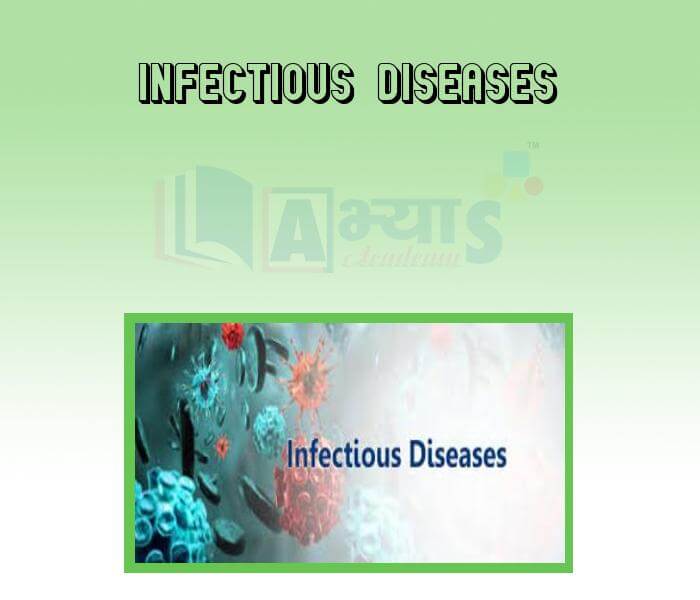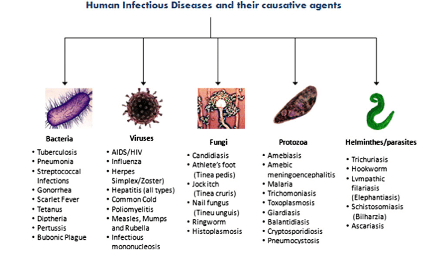Infectious Diseases










Infectious Diseases
Infectious diseases or communicable disease : An infectious disease that can be spread from one infected individual to another is called a communicable disease. An infectious disease can be spread from an infected person to a healthy person in many ways such as through food, water, air, direct contact, through a disease carrier like a mosquito, etc. Some infectious diseases are not communicable.
For example, tetanus is an infectious disease which affects the nerves and muscles of the patient. It is caused by a bacterium which enters the body when a wound comes in contact with contaminated soil or animal wastes. But tetanus cannot be spread from person to person. So, it is not a communicable disease.
Infectious diseases are caused by some biological agents (pathogens) such as viruses, bacteria, fungi and single- celled animal protozoans, etc. The presence of an infectious agent may affect the normal body function of the individual, leading to a disease. These can rapidly spread from one person to another by various means such as water, air, food, insects (vectors) or by physical contact. Some infectious diseases that develop and spread rapidly to many people are called epidemic diseases.
Infectious Agents: The unicellular or multicellular organisms that cause infection are called infectious agents. These disease causing organisms are also called pathogens and they are classified into a wide range of categories. Some of them are viruses, bacteria, fungi, protozoans, etc.
NOTE:
Corona disease 2019 (COVID-19) is also an infecticious disease. It is a contagious respiratory and vascular disease caused by SARS-CoV-2 virus.The first case was identified in Wuhan. Common symptoms of COVID-19 includes fever, cough, fatique,breathing difficulties,and loss of smell and taste.Symptoms begin in one to fourteen days after exposure to the virus.

Diuresis is a condition characterised by _______________ | |||
| Right Option : A | |||
| View Explanation | |||
Who discovered small pox vaccine? | |||
| Right Option : D | |||
| View Explanation | |||
Which one of the following acts as a physiological barrier to the entry of microorganism in human body? | |||
| Right Option : B | |||
| View Explanation | |||
Students / Parents Reviews [20]
Abhyas institute is one of the best coaching institute in the vicinity of Ambala cantt.The institute provides good and quality education to the students.The teachers are well experienced and are very helpful in solving the problems. The major advantages of the institute is extra classes for weak...

Shreya Shrivastava
8thMy experience with Abhyas is very good. I have learnt many things here like vedic maths and reasoning also. Teachers here first take our doubts and then there are assignments to verify our weak points.

Shivam Rana
7thA marvelous experience with Abhyas. I am glad to share that my ward has achieved more than enough at the Ambala ABHYAS centre. Years have passed on and more and more he has gained. May the centre flourish and develop day by day by the grace of God.

Archit Segal
7thIt was good as the experience because as we had come here we had been improved in a such envirnment created here.Extra is taught which is beneficial for future.

Eshan Arora
8thThe experience was nice. I studied here for three years and saw a tremendous change in myself. I started liking subjects like English and SST which earlier I ran from. Extra knowledge gave me confidence to overcome competitive exams. One of the best institutes for secondary education.

Aman Kumar Shrivastava
10thMy experience with Abhyas Academy has been very good. When I was not in Abhyas whenever teacher ask questions I could not speak it confidently but when I came in Abhyas, my speaking skills developed and now I am the first one to give the answer of teachers question.

Upmanyu Sharma
7thAbhyas is good institution and a innovative institute also. It is a good platform of beginners.Due to Abhyas,he has got knoweledge about reasoning and confidence.My son has improved his vocabulary because of Abhyas.Teacher have very friendly atmosphere also.

Manish Kumar
10thUsually we see institutes offering objective based learning which usually causes a lag behind in subjective examinations which is the pattern followed by schools. I think it is really a work of planning to make us students grab the advantages of modes of examination, Objective Subjective and Onli...

Anika Saxena
8thOne of the best institutes to develope a child interest in studies.Provides SST and English knowledge also unlike other institutes. Teachers are co operative and friendly online tests andPPT develope practical knowledge also.

Aman Kumar Shrivastava
10thWe started with lot of hope that Abhyas will help in better understnding of complex topics of highers classes. we are not disappointed with the progress our child has made after attending Abhyas. Though need to mention that we expected a lot more. On a scale of 1-10, we would give may be 7.

Manya
8thAbhyas is an institute of high repute. Yogansh has taken admission last year. It creates abilities in child to prepare for competitive exams. Students are motivated by living prizes on basis of performance in Abhyas exams. He is satisfied with institute.

Yogansh Nyasi
7thMy experience with Abhyas academy is very nice or it can be said wonderful. I have been studying here from seven class. I have been completing my journey of three years. I am tinking that I should join Abhyas Academy in tenth class as I am seeing much improvement in Maths and English

Hridey Preet
9thI have spent a wonderful time in Abhyas academy. It has made my reasoning more apt, English more stronger and Maths an interesting subject for me. It has given me a habbit of self studying

Yatharthi Sharma
10thAbhyas is a complete education Institute. Here extreme care is taken by teacher with the help of regular exam. Extra classes also conducted by the institute, if the student is weak.

Om Umang
10thIt has a great methodology. Students here can get analysis to their test quickly.We can learn easily through PPTs and the testing methods are good. We know that where we have to practice

Barkha Arora
10thAbhyas Methodology is very good. It is based on according to student and each child manages accordingly to its properly. Methodology has improved the abilities of students to shine them in future.

Manish Kumar
10thBeing a parent, I saw my daughter improvement in her studies by seeing a good result in all day to day compititive exam TMO, NSO, IEO etc and as well as studies. I have got a fruitful result from my daughter.

Prisha Gupta
8thIn terms of methodology I want to say that institute provides expert guidence and results oriented monitering supplements by requsite study material along with regular tests which help the students to improve their education skills.The techniques of providing education helps the students to asses...

Aman Kumar Shrivastava
10thAbhyas institute is one of the best coaching institute in the vicinity of Ambala Cantt area. The teachers of the institute are well experienced and very helpful in solving the problems of the students.The good thing of the institute is that it is providing extra classes for the students who are w...

Aman Kumar Shrivastava
10thWhen I have not joined Abhyas Academy, my skills of solving maths problems were not clear. But, after joining it, my skills have been developed and my concepts of science and SST are very well. I also came to know about other subjects such as vedic maths and reasoning.
